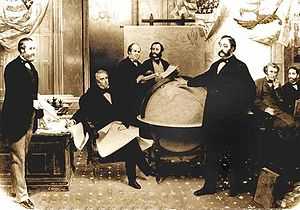Eduard de Stoeckl

Eduard Andreevich Stoeckl (Russian: Эдуард Андреевич Стекль) (Constantinople 1804 – Paris 1892) was a Russian diplomat best known today for having negotiated the American purchase of Alaska on behalf of the Russian government. He was son of Andreas von Stoeckl, Austrian diplomat in Constantinople, and Maria Pisani, daughter of Nicolas Pisani, Russian dragoman in Constantinople. He died in Paris on January 26, 1892.
Stoeckl occasionally used the bogus title of Baron. In the pre-1917 Russian aristocratic system the title "Baron" did not exist; nor does the Russian equivalent of "Sir." Being a distinguished diplomat and himself a nobleman in an era when British diplomats were virtually all addressed as "Sir" because they held that title, Stoeckl in America was referred to in the press or presented as "Baron." The word in Russian for a noble or nobleman is "baron."

In 1850 he became chargé d'affaires of the Russian embassy in Washington, and in 1854 held the post of minister, vacant after death of Aleksandr Bodisko. Like his predecessor, Stoeckl married an American woman, Elisa Howard.
Stoeckl established close friendly relations with many American officials and politicians, including the senator and the future Secretary of State William H. Seward, with whom he would later negotiate the Alaska purchase.
Stoeckl advocated the sale of Alaska (then known as Russian America) to the United States, asserting that this would allow the Russian government to concentrate its resources on Eastern Siberia, particularly the Amur River area. He insisted that by doing so, Russia would avoid any future conflict with the United States, viewing further U.S. expansion in North America as inevitable.
Later life
Stoeckl signed the Alaska Treaty in March 1867. For successfully carrying out the negotiation, Tsar Alexander II rewarded him with US$25,000 and an annual pension of $6,000.
Due to worsening health, Stoeckl resigned in 1869. He spent the final years of his life in France and died in Paris.
Bibliography
- Marie de Testa & Antoine Gautier, Le diplomate russe Edouard de Stoeckl (ca 1805-1892) et la cession de l'Alaska aux Etats-Unis, in Drogmans et diplomates européens auprès de la Porte ottomane, éditions ISIS, Istanbul, 2003, pp. 463–469.

